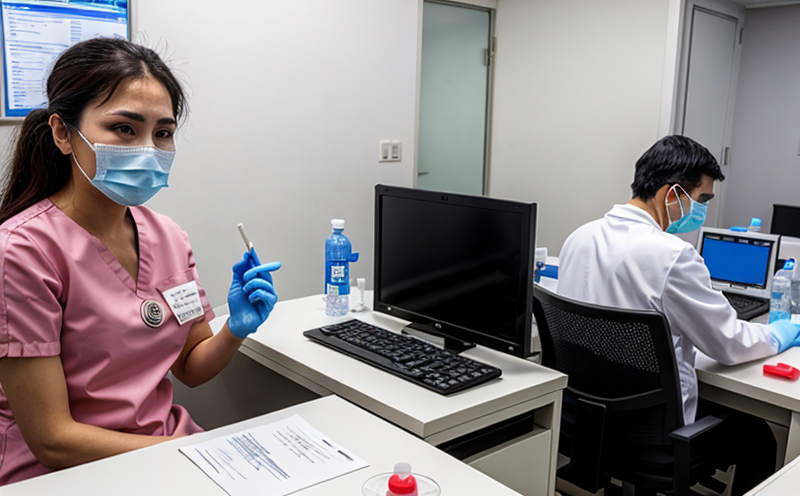Equine Herpesvirus Type 1/4 Testing in Horses
Equine herpesvirus type 1 (EHV-1) and EHV-4 are two of the most prevalent viral pathogens affecting horses, especially within the equine industry. These viruses can cause a range of clinical symptoms including respiratory disease, abortion, and neurological disorders. Early detection is critical for managing outbreaks, preventing complications, and ensuring herd health.
EHV-1 and EHV-4 testing typically involves the collection of swabs from the nasopharyngeal region or blood samples, which are then processed using polymerase chain reaction (PCR) technology to detect viral DNA. This method is highly sensitive and specific, allowing for accurate diagnosis even in asymptomatic carriers.
The importance of EHV-1/4 testing cannot be overstated. For instance, racing stables rely on this test to ensure their horses are free from the virus before entering competition. Similarly, breeding establishments use it as part of routine health checks prior to insemination or embryo transfer. In addition, veterinarians often recommend this test for horses showing signs of respiratory illness, particularly during outbreaks or in areas where disease transmission is a concern.
Accurate and timely testing provides several benefits beyond mere diagnosis. It helps in the early identification of infected individuals, enabling prompt isolation and treatment to prevent further spread within the population. Moreover, it supports herd health management by identifying asymptomatic carriers who might otherwise contribute to the persistence of disease.
The laboratory’s proficiency in EHV-1/4 testing is underpinned by state-of-the-art facilities equipped with advanced PCR machines from reputable manufacturers like ABI and Thermo Fisher Scientific. Our team of experienced technicians ensures that every sample undergoes rigorous quality control measures, ensuring reliable results within a short turnaround time.
Our commitment to excellence extends beyond technical proficiency; we adhere strictly to international standards such as ISO 17025 for our methods validation processes. This not only guarantees accuracy but also enhances the credibility of our findings in both national and international contexts.
Quality and Reliability Assurance
The reliability of EHV-1/4 testing is paramount given its role in maintaining equine health and preventing outbreaks. To ensure consistent high-quality results, we employ stringent quality assurance protocols at every stage of the process—from sample collection to final interpretation.
- Sample Handling: Samples are collected using sterile swabs or blood collection tubes following standardized procedures. These are then transported under optimal conditions to our laboratory for immediate processing.
- Instrumentation Calibration: Our PCR machines undergo regular calibration checks against certified reference standards to maintain precision and accuracy.
- Positive Controls: Every batch of tests includes positive controls, which serve as internal quality checks ensuring the reliability of each run.
- Negative Controls: These act similarly but are used to detect any potential contamination or errors during sample processing.
In addition to these technical safeguards, our laboratory participates in proficiency testing programs organized by recognized bodies such as the National Animal Health Laboratory Network (NAHLN) and the World Organisation for Animal Health (OIE). This external validation reinforces our commitment to delivering accurate and reliable results.
Competitive Advantage and Market Impact
EHV-1/4 testing is a vital tool in maintaining the integrity of equine populations, particularly within racing and breeding sectors. Our service offers significant competitive advantages by providing rapid, accurate diagnosis that can help manage outbreaks effectively.
- Preventive Measures: By identifying carriers early on, we assist clients in implementing targeted interventions to prevent disease spread, thus reducing the risk of costly disruptions.
- Compliance: Adherence to regulatory requirements for importing and exporting horses is streamlined through our reliable testing services, ensuring compliance with international health standards.
- Reputation Building: Consistently accurate results enhance client confidence in our services, fostering long-term relationships and business growth.
The impact of our EHV-1/4 testing extends beyond individual clients; it contributes to broader public health goals by supporting the overall well-being of equine populations. This aligns with global initiatives aimed at improving animal welfare and ensuring sustainable practices within the industry.
Use Cases and Application Examples
EHV-1/4 testing finds application in various scenarios, from routine health checks to outbreak management. Below are some illustrative examples:
- Racing Industry: Pre-race tests ensure that horses meet the stringent health requirements set by racing bodies.
- Breeding Farms: Testing forms part of pre-breeding protocols, helping to avoid potential genetic disorders linked with EHV-1/4 infection.
- Hospitalized Horses: In-hospital tests help monitor the recovery status of infected horses and guide treatment decisions.
- Outbreaks: During outbreaks, widespread testing is conducted to identify affected animals quickly, facilitating containment strategies.
In each case, our service provides critical information that informs decision-making processes aimed at minimizing disease impact. The real-world application of this technology underscores its significance in contemporary equine healthcare practices.





